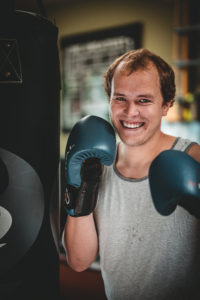Last month, the Victoria Film Festival trudged through COVID restrictions by going digital to make 50 full-length films and 23 shorts available online. A quick scroll through the lineup would reveal a face familiar to many who have attended classes at Lansdowne in recent years.
Follow My Brain is a locally made short that documents the recovery story of Camosun Mental Health and Addictions student Cam Webster, 25, who is currently in his second semester and hoping to graduate next year. The film offers a candid account of Webster’s experience with schizoaffective disorder.
“It all started less than a month after my 19th birthday,” says Webster. “I got sick with psychosis and I was hospitalized. Eventually, that led to a diagnosis of schizoaffective disorder, which means that I have symptoms of schizophrenia as well as symptoms of a mood disorder.”

But this isn’t a sad story. Webster says that the events that preceded his diagnosis took away a lot of the things he loved, but Follow My Brain focuses on his recovery.
“It was a life-changing event, but I worked through it,” says Webster. “I had to learn how to manage it and find support from my friends and family, but now I’m back in school, I’m back in boxing, and, really, I’m back doing all of the things I love.”
Webster says that ever since, he has been passionate about raising awareness and breaking down stigma by showing that recovery is not only possible but expected. For a few years, Webster ran a support group through The Stigma-Free Society alongside Robyn Thomas, who, it turned out, had a background in filmmaking.
“Eventually, Robyn approached me and asked if I was interested in doing a film,” says Webster. “I definitely was, so she introduced me to her partners Naomi Devine and Tamara Plush, and we made Follow My Brain. From the pilot trailer to the finished product was about a year, so it was a long journey. But it was good. I’m happy with the outcome.”
Thomas, who is currently pursuing her master’s in Global Mental Health at the University of Edinburgh, says that the goal of the filmmakers was to change the narrative around psychosis, something we don’t really hear a lot about it in the media.
“We often hear about things like anxiety and depression—which, of course, is important, too—but we don’t often hear about psychosis, and because of that there are a lot of false assumptions and discrimination around things like schizophrenia, schizoaffective [disorder], and psychosis,” says Thomas. “We approached Cam because he’s a really inspiring mental-health advocate who has been really open with his mental health.”
This was all new to Webster, who says that making his first film was both fun and difficult.
“I had never done drama or acting growing up, so it was kind of weird when we did some reenactments because I’m just not used to it,” says Webster. “Overall, it was a really good experience. The film team was very knowledgeable, so they could coach me through it.”
In order to honour Webster’s voice, Thomas says they basically had him guide the narrative of the film.
“Part of the process that we used was developing 30 questions and [we] put them in envelopes,” says Thomas. “We gave them to Cam and he answered them over 30 days with his own recording device.”
Webster says that the answers to those questions made up the story behind the film.
“To come up with the script for the film they actually gave me questions that I answered, one a day,” says Webster. “I’d spend about five minutes just talking to a recording device. Then we organized the visuals to add to it. It sounded more authentic and genuine when I was answering by myself with a recorder.”
Thomas—who says people will be able to see the film for free this summer through Telus Storyhive—credits much of the film’s success to Webster being so open about his experiences.
“And his whole family was really wonderful to work with,” says Thomas. “It can be a very intimidating thing to invite a group of strangers into your home and into your personal experiences. Mental health is something that affects the whole family, and they were all wonderful in inviting us into their lives and talking about their experiences with Cam’s mental-health journey.”
Webster says that Follow My Brain offered him a new way to raise awareness and teach things that he wishes he knew—or that his friends and family knew—when he got sick.
“For a while, when I was in the darkness of psychosis, I thought I would never recover,” says Webster. “I just hope someone who’s struggling, or their family or friends, watch the film and it gives them hope, because recovery is not only possible but it’s expected for people with psychosis.”
